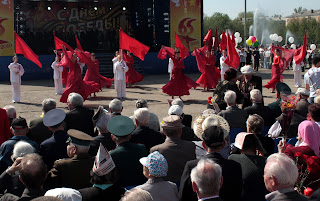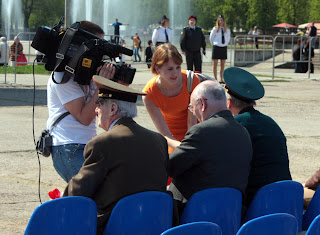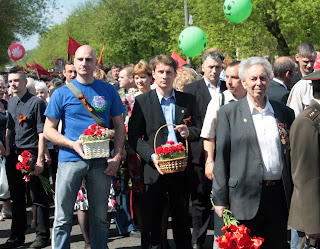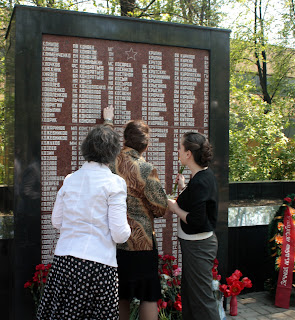The charismatic movement (imprecisely defined as Pentecostal experiences and reflection in Christian denominations and churches located outside the historically Pentecostal stream) spread rapidly in mainstream Protestantism and then the Roman Catholic Church, with proportionally smaller influences within Eastern Orthodoxy. Friends were also affected to a small degree--not so small if you count the rise of the Vineyard Fellowship.
Even more remarkably, charismatic meetings and Bible studies formed a whole new wave of functional ecumenism, bringing together Protestants of different flavors, and Catholics. My aunt and uncle in Canada, with whom I spent weekends during my university years, were part of that movement. They were active in their local Anglican parish, but were also part of a diverse charismatic fellowship that met at the Ottawa Friends meetinghouse.
Some Christians found new unity in these gatherings and revivals, but many churches were divided by their experiences. There were excesses in all directions--a stifling excess of caution by some church authorities, but also emotionalism and elitism among some charismatic dissidents, and sometimes an overdependence on a persuasive individual. Eventually my Canadian relatives left both their Anglican parish and their charismatic fellowship, and followed a dissident priest out of the Anglican church and into a house church that (I believe) suffered from a lack of wider accountability.
The charismatic renewal as a movement has almost disappeared. My uncle Axel sometimes looked back on that peak period as "charismania." David Neff has a more positive take:
Some analysts say the mainline charismatic renewal fizzled. It is more accurate to describe it the way Jesus pictured the kingdom of God: like yeast that spreads through bread dough. You can hardly identify it as a movement anymore, but it has changed the way most churches worship. Repetitive choruses and raised hands are now common. Except in pockets of hardcore resistance, the fact that a fellow Christian may praise God in a private prayer language hardly elevates an eyebrow.The broader Pentecostal/charismatic movement in Christianity, on the other hand, continues to grow rapidly, particularly outside the United States.
Neff's column includes a link to Luke Timothy Johnson's article, "Dry Bones: Why Religion Can't Live Without Mysticism," in Commonweal. Johnson talks about organized religion's exoteric dimension (focused on public expression and order) and esoteric dimension (focused on inner experience and devotion). Here's the heart of his article:
The benefits of the exoteric to the esoteric forms of religion over the ages have been clear to see. The framework of law and worship, creed and Scripture, provided both a social meaning and shared social practices that enabled individual mystics to thrive. They shared with their nonmystical fellow believers the public practice of prayer, the study of sacred texts, and the deeds of charity. Their passionate quest for the experience of God through prayer was the more secure because it pursued the God proclaimed publicly in synagogue, church, and mosque. Their asceticism was not an exception to, but rather an intensification of, the strict rules of behavior followed by the exoteric community. Mystics were able to swim freely, and dive deeply, in an ocean bounded by public profession and practice.Johnson's "exoteric" and "esoteric" labels remind me of the "spiritualizers" and "technocrats" I borrowed from Natural Church Development vocabulary to describe the life cycle of a religious movement. Both tendencies, if they forget to stay in dialogue about the central question, "Why?", can contribute to decline ... or revolution.
In return, mysticism enriched the outer tradition, providing a medium for impulses of passionate devotion, producing generations of saints who represent the best within each religion. By recognizing all visible forms as less than ultimate, mysticism challenges the claims of religious law to total control over humans, and stands as an anti-idolatrous witness within exoteric religion. It makes clear that religion is not simply another version of politics, but a form of faith that in its essence seeks to serve the living God; and that religion’s efforts to stabilize the world are not solely about the assertion of human power, but about the service of humanity. Because everything in religion must be measured by God, mysticism insists, and because God is not a controllable or even a fully knowable entity, religion must always be measured by a reality beyond definition. Asserting the ultimate reality and power of this invisible presence, and willingly sacrificing pleasure in this life for the sake of a future life with God, mysticism reminds the exoteric that it too is called to a service larger than itself.
Johnson goes on to warn that the exoteric dimension--especially its tendency toward control and coercion and its denigration of the unseen--has the apparent upper hand in all the monotheistic traditions. Aside from the spiritual cost to believers, this trend weakens religion in its confrontation with secularism. If we believers turn out just to be another political pressure group, no matter what our transcendant claims, why should the world give us the time of day?
Does this analysis have any relevance to our situation as Quakers in today's world? I sense that, as small as we are, we still have our own technocrats and spiritualizers, and our own temptations to mask spiritual poverty with platitudes or politics. But, judging by the links I've been seeing on quakerquaker.org over the last few years, the essential "why" dialogue does continue. To what extent does that conversation get into our local meetings and churches?
What I read this week:
Perversely stupid: "Constantly arguing in bad faith leads to thinking in bad faith and to living in bad faith, until bad faith is all you've got left."
Seth Godin asks, "Are you an elite?"
Is your Friends meeting for worship like this? Why or why not? (And how, if at all, does this video clip relate to David Neff's observation about the influence of the charismatic movement?)
Here's the video referenced in that post linked above. (The video doesn't appear there anymore.)
"The well of Soviet nostalgia is running dry."
From Denmark: a delicious "Hound Dog" by Michelle Birkballe (vocals and guitar), Morten Brauner (bass), Claus Daugaard (drums), Palle Hjort (keys), Kasper Lefty (guitar), Samuel Hejslet (sax)













No comments:
Post a Comment